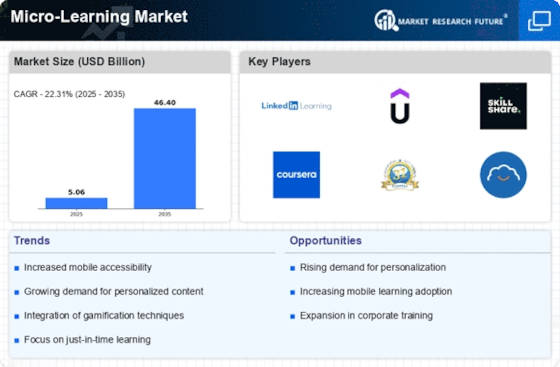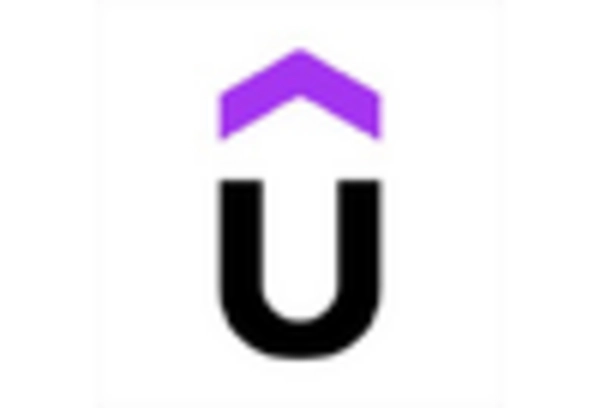-
EXECUTIVE SUMMARY
-
Market Overview
-
Key Findings
-
Market Segmentation
-
Competitive Landscape
-
Challenges and Opportunities
-
Future Outlook
-
MARKET INTRODUCTION
-
Definition
-
Scope of the study
- Research Objective
- Assumption
- Limitations
-
RESEARCH METHODOLOGY
-
Overview
-
Data Mining
-
Secondary Research
-
Primary Research
- Primary Interviews and Information Gathering Process
- Breakdown of Primary Respondents
-
Forecasting Model
-
Market Size Estimation
- Bottom-Up Approach
- Top-Down Approach
-
Data Triangulation
-
Validation
-
MARKET DYNAMICS
-
Overview
-
Drivers
-
Restraints
-
Opportunities
-
MARKET FACTOR ANALYSIS
-
Value chain Analysis
-
Porter''s Five Forces Analysis
- Bargaining Power of Suppliers
- Bargaining Power of Buyers
- Threat of New Entrants
- Threat of Substitutes
- Intensity of Rivalry
-
COVID-19 Impact Analysis
- Market Impact Analysis
- Regional Impact
- Opportunity and Threat Analysis
-
Micro-Learning Market, BY Application (USD Billion)
-
Corporate Training
-
Academic Learning
-
Personal Development
-
Compliance Training
-
Micro-Learning Market, BY Content Type (USD Billion)
-
Video
-
Text
-
Audio
-
Interactive
-
Micro-Learning Market, BY Deployment Mode (USD Billion)
-
Cloud-Based
-
On-Premises
-
Micro-Learning Market, BY User Type (USD Billion)
-
Individuals
-
Educational Institutions
-
Corporate Organizations
-
Micro-Learning Market, BY Regional (USD Billion)
-
North America
- US
- Canada
-
Europe
- Germany
- UK
- France
- Russia
- Italy
- Spain
- Rest of Europe
-
APAC
- China
- India
- Japan
- South Korea
- Malaysia
- Thailand
- Indonesia
- Rest of APAC
-
South America
- Brazil
- Mexico
- Argentina
- Rest of South America
-
MEA
- GCC Countries
- South Africa
- Rest of MEA
-
Competitive Landscape
-
Overview
-
Competitive Analysis
-
Market share Analysis
-
Major Growth Strategy in the Micro-Learning Market
-
Competitive Benchmarking
-
Leading Players in Terms of Number of Developments in the Micro-Learning Market
-
Key developments and growth strategies
- New Product Launch/Service Deployment
- Merger & Acquisitions
- Joint Ventures
-
Major Players Financial Matrix
- Sales and Operating Income
- Major Players R&D Expenditure. 2023
-
Company Profiles
-
EdApp
- Financial Overview
- Products Offered
- Key Developments
- SWOT Analysis
- Key Strategies
-
Axonify
- Financial Overview
- Products Offered
- Key Developments
- SWOT Analysis
- Key Strategies
-
Coursera
- Financial Overview
- Products Offered
- Key Developments
- SWOT Analysis
- Key Strategies
-
TalentLMS
- Financial Overview
- Products Offered
- Key Developments
- SWOT Analysis
- Key Strategies
-
Duolingo
- Financial Overview
- Products Offered
- Key Developments
- SWOT Analysis
- Key Strategies
-
Khan Academy
- Financial Overview
- Products Offered
- Key Developments
- SWOT Analysis
- Key Strategies
-
Grovo
- Financial Overview
- Products Offered
- Key Developments
- SWOT Analysis
- Key Strategies
-
LinkedIn Learning
- Financial Overview
- Products Offered
- Key Developments
- SWOT Analysis
- Key Strategies
-
Mindflash
- Financial Overview
- Products Offered
- Key Developments
- SWOT Analysis
- Key Strategies
-
LearnUpon
- Financial Overview
- Products Offered
- Key Developments
- SWOT Analysis
- Key Strategies
-
Udemy
- Financial Overview
- Products Offered
- Key Developments
- SWOT Analysis
- Key Strategies
-
Skillshare
- Financial Overview
- Products Offered
- Key Developments
- SWOT Analysis
- Key Strategies
-
Pluralsight
- Financial Overview
- Products Offered
- Key Developments
- SWOT Analysis
- Key Strategies
-
Alison
- Financial Overview
- Products Offered
- Key Developments
- SWOT Analysis
- Key Strategies
-
Lynda.com
- Financial Overview
- Products Offered
- Key Developments
- SWOT Analysis
- Key Strategies
-
Appendix
-
References
-
Related Reports
-
LIST Of tables
-
LIST OF ASSUMPTIONS
-
North America Micro-Learning Market SIZE ESTIMATES & FORECAST, BY APPLICATION, 2019-2032 (USD Billions)
-
North America Micro-Learning Market SIZE ESTIMATES & FORECAST, BY CONTENT TYPE, 2019-2032 (USD Billions)
-
North America Micro-Learning Market SIZE ESTIMATES & FORECAST, BY DEPLOYMENT MODE, 2019-2032 (USD Billions)
-
North America Micro-Learning Market SIZE ESTIMATES & FORECAST, BY USER TYPE, 2019-2032 (USD Billions)
-
North America Micro-Learning Market SIZE ESTIMATES & FORECAST, BY REGIONAL, 2019-2032 (USD Billions)
-
US Micro-Learning Market SIZE ESTIMATES & FORECAST, BY APPLICATION, 2019-2032 (USD Billions)
-
US Micro-Learning Market SIZE ESTIMATES & FORECAST, BY CONTENT TYPE, 2019-2032 (USD Billions)
-
US Micro-Learning Market SIZE ESTIMATES & FORECAST, BY DEPLOYMENT MODE, 2019-2032 (USD Billions)
-
US Micro-Learning Market SIZE ESTIMATES & FORECAST, BY USER TYPE, 2019-2032 (USD Billions)
-
US Micro-Learning Market SIZE ESTIMATES & FORECAST, BY REGIONAL, 2019-2032 (USD Billions)
-
Canada Micro-Learning Market SIZE ESTIMATES & FORECAST, BY APPLICATION, 2019-2032 (USD Billions)
-
Canada Micro-Learning Market SIZE ESTIMATES & FORECAST, BY CONTENT TYPE, 2019-2032 (USD Billions)
-
Canada Micro-Learning Market SIZE ESTIMATES & FORECAST, BY DEPLOYMENT MODE, 2019-2032 (USD Billions)
-
Canada Micro-Learning Market SIZE ESTIMATES & FORECAST, BY USER TYPE, 2019-2032 (USD Billions)
-
Canada Micro-Learning Market SIZE ESTIMATES & FORECAST, BY REGIONAL, 2019-2032 (USD Billions)
-
Europe Micro-Learning Market SIZE ESTIMATES & FORECAST, BY APPLICATION, 2019-2032 (USD Billions)
-
Europe Micro-Learning Market SIZE ESTIMATES & FORECAST, BY CONTENT TYPE, 2019-2032 (USD Billions)
-
Europe Micro-Learning Market SIZE ESTIMATES & FORECAST, BY DEPLOYMENT MODE, 2019-2032 (USD Billions)
-
Europe Micro-Learning Market SIZE ESTIMATES & FORECAST, BY USER TYPE, 2019-2032 (USD Billions)
-
Europe Micro-Learning Market SIZE ESTIMATES & FORECAST, BY REGIONAL, 2019-2032 (USD Billions)
-
Germany Micro-Learning Market SIZE ESTIMATES & FORECAST, BY APPLICATION, 2019-2032 (USD Billions)
-
Germany Micro-Learning Market SIZE ESTIMATES & FORECAST, BY CONTENT TYPE, 2019-2032 (USD Billions)
-
Germany Micro-Learning Market SIZE ESTIMATES & FORECAST, BY DEPLOYMENT MODE, 2019-2032 (USD Billions)
-
Germany Micro-Learning Market SIZE ESTIMATES & FORECAST, BY USER TYPE, 2019-2032 (USD Billions)
-
Germany Micro-Learning Market SIZE ESTIMATES & FORECAST, BY REGIONAL, 2019-2032 (USD Billions)
-
UK Micro-Learning Market SIZE ESTIMATES & FORECAST, BY APPLICATION, 2019-2032 (USD Billions)
-
UK Micro-Learning Market SIZE ESTIMATES & FORECAST, BY CONTENT TYPE, 2019-2032 (USD Billions)
-
UK Micro-Learning Market SIZE ESTIMATES & FORECAST, BY DEPLOYMENT MODE, 2019-2032 (USD Billions)
-
UK Micro-Learning Market SIZE ESTIMATES & FORECAST, BY USER TYPE, 2019-2032 (USD Billions)
-
UK Micro-Learning Market SIZE ESTIMATES & FORECAST, BY REGIONAL, 2019-2032 (USD Billions)
-
France Micro-Learning Market SIZE ESTIMATES & FORECAST, BY APPLICATION, 2019-2032 (USD Billions)
-
France Micro-Learning Market SIZE ESTIMATES & FORECAST, BY CONTENT TYPE, 2019-2032 (USD Billions)
-
France Micro-Learning Market SIZE ESTIMATES & FORECAST, BY DEPLOYMENT MODE, 2019-2032 (USD Billions)
-
France Micro-Learning Market SIZE ESTIMATES & FORECAST, BY USER TYPE, 2019-2032 (USD Billions)
-
France Micro-Learning Market SIZE ESTIMATES & FORECAST, BY REGIONAL, 2019-2032 (USD Billions)
-
Russia Micro-Learning Market SIZE ESTIMATES & FORECAST, BY APPLICATION, 2019-2032 (USD Billions)
-
Russia Micro-Learning Market SIZE ESTIMATES & FORECAST, BY CONTENT TYPE, 2019-2032 (USD Billions)
-
Russia Micro-Learning Market SIZE ESTIMATES & FORECAST, BY DEPLOYMENT MODE, 2019-2032 (USD Billions)
-
Russia Micro-Learning Market SIZE ESTIMATES & FORECAST, BY USER TYPE, 2019-2032 (USD Billions)
-
Russia Micro-Learning Market SIZE ESTIMATES & FORECAST, BY REGIONAL, 2019-2032 (USD Billions)
-
Italy Micro-Learning Market SIZE ESTIMATES & FORECAST, BY APPLICATION, 2019-2032 (USD Billions)
-
Italy Micro-Learning Market SIZE ESTIMATES & FORECAST, BY CONTENT TYPE, 2019-2032 (USD Billions)
-
Italy Micro-Learning Market SIZE ESTIMATES & FORECAST, BY DEPLOYMENT MODE, 2019-2032 (USD Billions)
-
Italy Micro-Learning Market SIZE ESTIMATES & FORECAST, BY USER TYPE, 2019-2032 (USD Billions)
-
Italy Micro-Learning Market SIZE ESTIMATES & FORECAST, BY REGIONAL, 2019-2032 (USD Billions)
-
Spain Micro-Learning Market SIZE ESTIMATES & FORECAST, BY APPLICATION, 2019-2032 (USD Billions)
-
Spain Micro-Learning Market SIZE ESTIMATES & FORECAST, BY CONTENT TYPE, 2019-2032 (USD Billions)
-
Spain Micro-Learning Market SIZE ESTIMATES & FORECAST, BY DEPLOYMENT MODE, 2019-2032 (USD Billions)
-
Spain Micro-Learning Market SIZE ESTIMATES & FORECAST, BY USER TYPE, 2019-2032 (USD Billions)
-
Spain Micro-Learning Market SIZE ESTIMATES & FORECAST, BY REGIONAL, 2019-2032 (USD Billions)
-
Rest of Europe Micro-Learning Market SIZE ESTIMATES & FORECAST, BY APPLICATION, 2019-2032 (USD Billions)
-
Rest of Europe Micro-Learning Market SIZE ESTIMATES & FORECAST, BY CONTENT TYPE, 2019-2032 (USD Billions)
-
Rest of Europe Micro-Learning Market SIZE ESTIMATES & FORECAST, BY DEPLOYMENT MODE, 2019-2032 (USD Billions)
-
Rest of Europe Micro-Learning Market SIZE ESTIMATES & FORECAST, BY USER TYPE, 2019-2032 (USD Billions)
-
Rest of Europe Micro-Learning Market SIZE ESTIMATES & FORECAST, BY REGIONAL, 2019-2032 (USD Billions)
-
APAC Micro-Learning Market SIZE ESTIMATES & FORECAST, BY APPLICATION, 2019-2032 (USD Billions)
-
APAC Micro-Learning Market SIZE ESTIMATES & FORECAST, BY CONTENT TYPE, 2019-2032 (USD Billions)
-
APAC Micro-Learning Market SIZE ESTIMATES & FORECAST, BY DEPLOYMENT MODE, 2019-2032 (USD Billions)
-
APAC Micro-Learning Market SIZE ESTIMATES & FORECAST, BY USER TYPE, 2019-2032 (USD Billions)
-
APAC Micro-Learning Market SIZE ESTIMATES & FORECAST, BY REGIONAL, 2019-2032 (USD Billions)
-
China Micro-Learning Market SIZE ESTIMATES & FORECAST, BY APPLICATION, 2019-2032 (USD Billions)
-
China Micro-Learning Market SIZE ESTIMATES & FORECAST, BY CONTENT TYPE, 2019-2032 (USD Billions)
-
China Micro-Learning Market SIZE ESTIMATES & FORECAST, BY DEPLOYMENT MODE, 2019-2032 (USD Billions)
-
China Micro-Learning Market SIZE ESTIMATES & FORECAST, BY USER TYPE, 2019-2032 (USD Billions)
-
China Micro-Learning Market SIZE ESTIMATES & FORECAST, BY REGIONAL, 2019-2032 (USD Billions)
-
India Micro-Learning Market SIZE ESTIMATES & FORECAST, BY APPLICATION, 2019-2032 (USD Billions)
-
India Micro-Learning Market SIZE ESTIMATES & FORECAST, BY CONTENT TYPE, 2019-2032 (USD Billions)
-
India Micro-Learning Market SIZE ESTIMATES & FORECAST, BY DEPLOYMENT MODE, 2019-2032 (USD Billions)
-
India Micro-Learning Market SIZE ESTIMATES & FORECAST, BY USER TYPE, 2019-2032 (USD Billions)
-
India Micro-Learning Market SIZE ESTIMATES & FORECAST, BY REGIONAL, 2019-2032 (USD Billions)
-
Japan Micro-Learning Market SIZE ESTIMATES & FORECAST, BY APPLICATION, 2019-2032 (USD Billions)
-
Japan Micro-Learning Market SIZE ESTIMATES & FORECAST, BY CONTENT TYPE, 2019-2032 (USD Billions)
-
Japan Micro-Learning Market SIZE ESTIMATES & FORECAST, BY DEPLOYMENT MODE, 2019-2032 (USD Billions)
-
Japan Micro-Learning Market SIZE ESTIMATES & FORECAST, BY USER TYPE, 2019-2032 (USD Billions)
-
Japan Micro-Learning Market SIZE ESTIMATES & FORECAST, BY REGIONAL, 2019-2032 (USD Billions)
-
South Korea Micro-Learning Market SIZE ESTIMATES & FORECAST, BY APPLICATION, 2019-2032 (USD Billions)
-
South Korea Micro-Learning Market SIZE ESTIMATES & FORECAST, BY CONTENT TYPE, 2019-2032 (USD Billions)
-
South Korea Micro-Learning Market SIZE ESTIMATES & FORECAST, BY DEPLOYMENT MODE, 2019-2032 (USD Billions)
-
South Korea Micro-Learning Market SIZE ESTIMATES & FORECAST, BY USER TYPE, 2019-2032 (USD Billions)
-
South Korea Micro-Learning Market SIZE ESTIMATES & FORECAST, BY REGIONAL, 2019-2032 (USD Billions)
-
Malaysia Micro-Learning Market SIZE ESTIMATES & FORECAST, BY APPLICATION, 2019-2032 (USD Billions)
-
Malaysia Micro-Learning Market SIZE ESTIMATES & FORECAST, BY CONTENT TYPE, 2019-2032 (USD Billions)
-
Malaysia Micro-Learning Market SIZE ESTIMATES & FORECAST, BY DEPLOYMENT MODE, 2019-2032 (USD Billions)
-
Malaysia Micro-Learning Market SIZE ESTIMATES & FORECAST, BY USER TYPE, 2019-2032 (USD Billions)
-
Malaysia Micro-Learning Market SIZE ESTIMATES & FORECAST, BY REGIONAL, 2019-2032 (USD Billions)
-
Thailand Micro-Learning Market SIZE ESTIMATES & FORECAST, BY APPLICATION, 2019-2032 (USD Billions)
-
Thailand Micro-Learning Market SIZE ESTIMATES & FORECAST, BY CONTENT TYPE, 2019-2032 (USD Billions)
-
Thailand Micro-Learning Market SIZE ESTIMATES & FORECAST, BY DEPLOYMENT MODE, 2019-2032 (USD Billions)
-
Thailand Micro-Learning Market SIZE ESTIMATES & FORECAST, BY USER TYPE, 2019-2032 (USD Billions)
-
Thailand Micro-Learning Market SIZE ESTIMATES & FORECAST, BY REGIONAL, 2019-2032 (USD Billions)
-
Indonesia Micro-Learning Market SIZE ESTIMATES & FORECAST, BY APPLICATION, 2019-2032 (USD Billions)
-
Indonesia Micro-Learning Market SIZE ESTIMATES & FORECAST, BY CONTENT TYPE, 2019-2032 (USD Billions)
-
Indonesia Micro-Learning Market SIZE ESTIMATES & FORECAST, BY DEPLOYMENT MODE, 2019-2032 (USD Billions)
-
Indonesia Micro-Learning Market SIZE ESTIMATES & FORECAST, BY USER TYPE, 2019-2032 (USD Billions)
-
Indonesia Micro-Learning Market SIZE ESTIMATES & FORECAST, BY REGIONAL, 2019-2032 (USD Billions)
-
Rest of APAC Micro-Learning Market SIZE ESTIMATES & FORECAST, BY APPLICATION, 2019-2032 (USD Billions)
-
Rest of APAC Micro-Learning Market SIZE ESTIMATES & FORECAST, BY CONTENT TYPE, 2019-2032 (USD Billions)
-
Rest of APAC Micro-Learning Market SIZE ESTIMATES & FORECAST, BY DEPLOYMENT MODE, 2019-2032 (USD Billions)
-
Rest of APAC Micro-Learning Market SIZE ESTIMATES & FORECAST, BY USER TYPE, 2019-2032 (USD Billions)
-
Rest of APAC Micro-Learning Market SIZE ESTIMATES & FORECAST, BY REGIONAL, 2019-2032 (USD Billions)
-
South America Micro-Learning Market SIZE ESTIMATES & FORECAST, BY APPLICATION, 2019-2032 (USD Billions)
-
South America Micro-Learning Market SIZE ESTIMATES & FORECAST, BY CONTENT TYPE, 2019-2032 (USD Billions)
-
South America Micro-Learning Market SIZE ESTIMATES & FORECAST, BY DEPLOYMENT MODE, 2019-2032 (USD Billions)
-
South America Micro-Learning Market SIZE ESTIMATES & FORECAST, BY USER TYPE, 2019-2032 (USD Billions)
-
South America Micro-Learning Market SIZE ESTIMATES & FORECAST, BY REGIONAL, 2019-2032 (USD Billions)
-
Brazil Micro-Learning Market SIZE ESTIMATES & FORECAST, BY APPLICATION, 2019-2032 (USD Billions)
-
Brazil Micro-Learning Market SIZE ESTIMATES & FORECAST, BY CONTENT TYPE, 2019-2032 (USD Billions)
-
Brazil Micro-Learning Market SIZE ESTIMATES & FORECAST, BY DEPLOYMENT MODE, 2019-2032 (USD Billions)
-
Brazil Micro-Learning Market SIZE ESTIMATES & FORECAST, BY USER TYPE, 2019-2032 (USD Billions)
-
Brazil Micro-Learning Market SIZE ESTIMATES & FORECAST, BY REGIONAL, 2019-2032 (USD Billions)
-
Mexico Micro-Learning Market SIZE ESTIMATES & FORECAST, BY APPLICATION, 2019-2032 (USD Billions)
-
Mexico Micro-Learning Market SIZE ESTIMATES & FORECAST, BY CONTENT TYPE, 2019-2032 (USD Billions)
-
Mexico Micro-Learning Market SIZE ESTIMATES & FORECAST, BY DEPLOYMENT MODE, 2019-2032 (USD Billions)
-
Mexico Micro-Learning Market SIZE ESTIMATES & FORECAST, BY USER TYPE, 2019-2032 (USD Billions)
-
Mexico Micro-Learning Market SIZE ESTIMATES & FORECAST, BY REGIONAL, 2019-2032 (USD Billions)
-
Argentina Micro-Learning Market SIZE ESTIMATES & FORECAST, BY APPLICATION, 2019-2032 (USD Billions)
-
Argentina Micro-Learning Market SIZE ESTIMATES & FORECAST, BY CONTENT TYPE, 2019-2032 (USD Billions)
-
Argentina Micro-Learning Market SIZE ESTIMATES & FORECAST, BY DEPLOYMENT MODE, 2019-2032 (USD Billions)
-
Argentina Micro-Learning Market SIZE ESTIMATES & FORECAST, BY USER TYPE, 2019-2032 (USD Billions)
-
Argentina Micro-Learning Market SIZE ESTIMATES & FORECAST, BY REGIONAL, 2019-2032 (USD Billions)
-
Rest of South America Micro-Learning Market SIZE ESTIMATES & FORECAST, BY APPLICATION, 2019-2032 (USD Billions)
-
Rest of South America Micro-Learning Market SIZE ESTIMATES & FORECAST, BY CONTENT TYPE, 2019-2032 (USD Billions)
-
Rest of South America Micro-Learning Market SIZE ESTIMATES & FORECAST, BY DEPLOYMENT MODE, 2019-2032 (USD Billions)
-
Rest of South America Micro-Learning Market SIZE ESTIMATES & FORECAST, BY USER TYPE, 2019-2032 (USD Billions)
-
Rest of South America Micro-Learning Market SIZE ESTIMATES & FORECAST, BY REGIONAL, 2019-2032 (USD Billions)
-
MEA Micro-Learning Market SIZE ESTIMATES & FORECAST, BY APPLICATION, 2019-2032 (USD Billions)
-
MEA Micro-Learning Market SIZE ESTIMATES & FORECAST, BY CONTENT TYPE, 2019-2032 (USD Billions)
-
MEA Micro-Learning Market SIZE ESTIMATES & FORECAST, BY DEPLOYMENT MODE, 2019-2032 (USD Billions)
-
MEA Micro-Learning Market SIZE ESTIMATES & FORECAST, BY USER TYPE, 2019-2032 (USD Billions)
-
MEA Micro-Learning Market SIZE ESTIMATES & FORECAST, BY REGIONAL, 2019-2032 (USD Billions)
-
GCC Countries Micro-Learning Market SIZE ESTIMATES & FORECAST, BY APPLICATION, 2019-2032 (USD Billions)
-
GCC Countries Micro-Learning Market SIZE ESTIMATES & FORECAST, BY CONTENT TYPE, 2019-2032 (USD Billions)
-
GCC Countries Micro-Learning Market SIZE ESTIMATES & FORECAST, BY DEPLOYMENT MODE, 2019-2032 (USD Billions)
-
GCC Countries Micro-Learning Market SIZE ESTIMATES & FORECAST, BY USER TYPE, 2019-2032 (USD Billions)
-
GCC Countries Micro-Learning Market SIZE ESTIMATES & FORECAST, BY REGIONAL, 2019-2032 (USD Billions)
-
South Africa Micro-Learning Market SIZE ESTIMATES & FORECAST, BY APPLICATION, 2019-2032 (USD Billions)
-
South Africa Micro-Learning Market SIZE ESTIMATES & FORECAST, BY CONTENT TYPE, 2019-2032 (USD Billions)
-
South Africa Micro-Learning Market SIZE ESTIMATES & FORECAST, BY DEPLOYMENT MODE, 2019-2032 (USD Billions)
-
South Africa Micro-Learning Market SIZE ESTIMATES & FORECAST, BY USER TYPE, 2019-2032 (USD Billions)
-
South Africa Micro-Learning Market SIZE ESTIMATES & FORECAST, BY REGIONAL, 2019-2032 (USD Billions)
-
Rest of MEA Micro-Learning Market SIZE ESTIMATES & FORECAST, BY APPLICATION, 2019-2032 (USD Billions)
-
Rest of MEA Micro-Learning Market SIZE ESTIMATES & FORECAST, BY CONTENT TYPE, 2019-2032 (USD Billions)
-
Rest of MEA Micro-Learning Market SIZE ESTIMATES & FORECAST, BY DEPLOYMENT MODE, 2019-2032 (USD Billions)
-
Rest of MEA Micro-Learning Market SIZE ESTIMATES & FORECAST, BY USER TYPE, 2019-2032 (USD Billions)
-
Rest of MEA Micro-Learning Market SIZE ESTIMATES & FORECAST, BY REGIONAL, 2019-2032 (USD Billions)
-
PRODUCT LAUNCH/PRODUCT DEVELOPMENT/APPROVAL
-
ACQUISITION/PARTNERSHIP
-
LIST Of figures
-
MARKET SYNOPSIS
-
NORTH AMERICA MICRO-LEARNING MARKET ANALYSIS
-
US MICRO-LEARNING MARKET ANALYSIS BY APPLICATION
-
US MICRO-LEARNING MARKET ANALYSIS BY CONTENT TYPE
-
US MICRO-LEARNING MARKET ANALYSIS BY DEPLOYMENT MODE
-
US MICRO-LEARNING MARKET ANALYSIS BY USER TYPE
-
US MICRO-LEARNING MARKET ANALYSIS BY REGIONAL
-
CANADA MICRO-LEARNING MARKET ANALYSIS BY APPLICATION
-
CANADA MICRO-LEARNING MARKET ANALYSIS BY CONTENT TYPE
-
CANADA MICRO-LEARNING MARKET ANALYSIS BY DEPLOYMENT MODE
-
CANADA MICRO-LEARNING MARKET ANALYSIS BY USER TYPE
-
CANADA MICRO-LEARNING MARKET ANALYSIS BY REGIONAL
-
EUROPE MICRO-LEARNING MARKET ANALYSIS
-
GERMANY MICRO-LEARNING MARKET ANALYSIS BY APPLICATION
-
GERMANY MICRO-LEARNING MARKET ANALYSIS BY CONTENT TYPE
-
GERMANY MICRO-LEARNING MARKET ANALYSIS BY DEPLOYMENT MODE
-
GERMANY MICRO-LEARNING MARKET ANALYSIS BY USER TYPE
-
GERMANY MICRO-LEARNING MARKET ANALYSIS BY REGIONAL
-
UK MICRO-LEARNING MARKET ANALYSIS BY APPLICATION
-
UK MICRO-LEARNING MARKET ANALYSIS BY CONTENT TYPE
-
UK MICRO-LEARNING MARKET ANALYSIS BY DEPLOYMENT MODE
-
UK MICRO-LEARNING MARKET ANALYSIS BY USER TYPE
-
UK MICRO-LEARNING MARKET ANALYSIS BY REGIONAL
-
FRANCE MICRO-LEARNING MARKET ANALYSIS BY APPLICATION
-
FRANCE MICRO-LEARNING MARKET ANALYSIS BY CONTENT TYPE
-
FRANCE MICRO-LEARNING MARKET ANALYSIS BY DEPLOYMENT MODE
-
FRANCE MICRO-LEARNING MARKET ANALYSIS BY USER TYPE
-
FRANCE MICRO-LEARNING MARKET ANALYSIS BY REGIONAL
-
RUSSIA MICRO-LEARNING MARKET ANALYSIS BY APPLICATION
-
RUSSIA MICRO-LEARNING MARKET ANALYSIS BY CONTENT TYPE
-
RUSSIA MICRO-LEARNING MARKET ANALYSIS BY DEPLOYMENT MODE
-
RUSSIA MICRO-LEARNING MARKET ANALYSIS BY USER TYPE
-
RUSSIA MICRO-LEARNING MARKET ANALYSIS BY REGIONAL
-
ITALY MICRO-LEARNING MARKET ANALYSIS BY APPLICATION
-
ITALY MICRO-LEARNING MARKET ANALYSIS BY CONTENT TYPE
-
ITALY MICRO-LEARNING MARKET ANALYSIS BY DEPLOYMENT MODE
-
ITALY MICRO-LEARNING MARKET ANALYSIS BY USER TYPE
-
ITALY MICRO-LEARNING MARKET ANALYSIS BY REGIONAL
-
SPAIN MICRO-LEARNING MARKET ANALYSIS BY APPLICATION
-
SPAIN MICRO-LEARNING MARKET ANALYSIS BY CONTENT TYPE
-
SPAIN MICRO-LEARNING MARKET ANALYSIS BY DEPLOYMENT MODE
-
SPAIN MICRO-LEARNING MARKET ANALYSIS BY USER TYPE
-
SPAIN MICRO-LEARNING MARKET ANALYSIS BY REGIONAL
-
REST OF EUROPE MICRO-LEARNING MARKET ANALYSIS BY APPLICATION
-
REST OF EUROPE MICRO-LEARNING MARKET ANALYSIS BY CONTENT TYPE
-
REST OF EUROPE MICRO-LEARNING MARKET ANALYSIS BY DEPLOYMENT MODE
-
REST OF EUROPE MICRO-LEARNING MARKET ANALYSIS BY USER TYPE
-
REST OF EUROPE MICRO-LEARNING MARKET ANALYSIS BY REGIONAL
-
APAC MICRO-LEARNING MARKET ANALYSIS
-
CHINA MICRO-LEARNING MARKET ANALYSIS BY APPLICATION
-
CHINA MICRO-LEARNING MARKET ANALYSIS BY CONTENT TYPE
-
CHINA MICRO-LEARNING MARKET ANALYSIS BY DEPLOYMENT MODE
-
CHINA MICRO-LEARNING MARKET ANALYSIS BY USER TYPE
-
CHINA MICRO-LEARNING MARKET ANALYSIS BY REGIONAL
-
INDIA MICRO-LEARNING MARKET ANALYSIS BY APPLICATION
-
INDIA MICRO-LEARNING MARKET ANALYSIS BY CONTENT TYPE
-
INDIA MICRO-LEARNING MARKET ANALYSIS BY DEPLOYMENT MODE
-
INDIA MICRO-LEARNING MARKET ANALYSIS BY USER TYPE
-
INDIA MICRO-LEARNING MARKET ANALYSIS BY REGIONAL
-
JAPAN MICRO-LEARNING MARKET ANALYSIS BY APPLICATION
-
JAPAN MICRO-LEARNING MARKET ANALYSIS BY CONTENT TYPE
-
JAPAN MICRO-LEARNING MARKET ANALYSIS BY DEPLOYMENT MODE
-
JAPAN MICRO-LEARNING MARKET ANALYSIS BY USER TYPE
-
JAPAN MICRO-LEARNING MARKET ANALYSIS BY REGIONAL
-
SOUTH KOREA MICRO-LEARNING MARKET ANALYSIS BY APPLICATION
-
SOUTH KOREA MICRO-LEARNING MARKET ANALYSIS BY CONTENT TYPE
-
SOUTH KOREA MICRO-LEARNING MARKET ANALYSIS BY DEPLOYMENT MODE
-
SOUTH KOREA MICRO-LEARNING MARKET ANALYSIS BY USER TYPE
-
SOUTH KOREA MICRO-LEARNING MARKET ANALYSIS BY REGIONAL
-
MALAYSIA MICRO-LEARNING MARKET ANALYSIS BY APPLICATION
-
MALAYSIA MICRO-LEARNING MARKET ANALYSIS BY CONTENT TYPE
-
MALAYSIA MICRO-LEARNING MARKET ANALYSIS BY DEPLOYMENT MODE
-
MALAYSIA MICRO-LEARNING MARKET ANALYSIS BY USER TYPE
-
MALAYSIA MICRO-LEARNING MARKET ANALYSIS BY REGIONAL
-
THAILAND MICRO-LEARNING MARKET ANALYSIS BY APPLICATION
-
THAILAND MICRO-LEARNING MARKET ANALYSIS BY CONTENT TYPE
-
THAILAND MICRO-LEARNING MARKET ANALYSIS BY DEPLOYMENT MODE
-
THAILAND MICRO-LEARNING MARKET ANALYSIS BY USER TYPE
-
THAILAND MICRO-LEARNING MARKET ANALYSIS BY REGIONAL
-
INDONESIA MICRO-LEARNING MARKET ANALYSIS BY APPLICATION
-
INDONESIA MICRO-LEARNING MARKET ANALYSIS BY CONTENT TYPE
-
INDONESIA MICRO-LEARNING MARKET ANALYSIS BY DEPLOYMENT MODE
-
INDONESIA MICRO-LEARNING MARKET ANALYSIS BY USER TYPE
-
INDONESIA MICRO-LEARNING MARKET ANALYSIS BY REGIONAL
-
REST OF APAC MICRO-LEARNING MARKET ANALYSIS BY APPLICATION
-
REST OF APAC MICRO-LEARNING MARKET ANALYSIS BY CONTENT TYPE
-
REST OF APAC MICRO-LEARNING MARKET ANALYSIS BY DEPLOYMENT MODE
-
REST OF APAC MICRO-LEARNING MARKET ANALYSIS BY USER TYPE
-
REST OF APAC MICRO-LEARNING MARKET ANALYSIS BY REGIONAL
-
SOUTH AMERICA MICRO-LEARNING MARKET ANALYSIS
-
BRAZIL MICRO-LEARNING MARKET ANALYSIS BY APPLICATION
-
BRAZIL MICRO-LEARNING MARKET ANALYSIS BY CONTENT TYPE
-
BRAZIL MICRO-LEARNING MARKET ANALYSIS BY DEPLOYMENT MODE
-
BRAZIL MICRO-LEARNING MARKET ANALYSIS BY USER TYPE
-
BRAZIL MICRO-LEARNING MARKET ANALYSIS BY REGIONAL
-
MEXICO MICRO-LEARNING MARKET ANALYSIS BY APPLICATION
-
MEXICO MICRO-LEARNING MARKET ANALYSIS BY CONTENT TYPE
-
MEXICO MICRO-LEARNING MARKET ANALYSIS BY DEPLOYMENT MODE
-
MEXICO MICRO-LEARNING MARKET ANALYSIS BY USER TYPE
-
MEXICO MICRO-LEARNING MARKET ANALYSIS BY REGIONAL
-
ARGENTINA MICRO-LEARNING MARKET ANALYSIS BY APPLICATION
-
ARGENTINA MICRO-LEARNING MARKET ANALYSIS BY CONTENT TYPE
-
ARGENTINA MICRO-LEARNING MARKET ANALYSIS BY DEPLOYMENT MODE
-
ARGENTINA MICRO-LEARNING MARKET ANALYSIS BY USER TYPE
-
ARGENTINA MICRO-LEARNING MARKET ANALYSIS BY REGIONAL
-
REST OF SOUTH AMERICA MICRO-LEARNING MARKET ANALYSIS BY APPLICATION
-
REST OF SOUTH AMERICA MICRO-LEARNING MARKET ANALYSIS BY CONTENT TYPE
-
REST OF SOUTH AMERICA MICRO-LEARNING MARKET ANALYSIS BY DEPLOYMENT MODE
-
REST OF SOUTH AMERICA MICRO-LEARNING MARKET ANALYSIS BY USER TYPE
-
REST OF SOUTH AMERICA MICRO-LEARNING MARKET ANALYSIS BY REGIONAL
-
MEA MICRO-LEARNING MARKET ANALYSIS
-
GCC COUNTRIES MICRO-LEARNING MARKET ANALYSIS BY APPLICATION
-
GCC COUNTRIES MICRO-LEARNING MARKET ANALYSIS BY CONTENT TYPE
-
GCC COUNTRIES MICRO-LEARNING MARKET ANALYSIS BY DEPLOYMENT MODE
-
GCC COUNTRIES MICRO-LEARNING MARKET ANALYSIS BY USER TYPE
-
GCC COUNTRIES MICRO-LEARNING MARKET ANALYSIS BY REGIONAL
-
SOUTH AFRICA MICRO-LEARNING MARKET ANALYSIS BY APPLICATION
-
SOUTH AFRICA MICRO-LEARNING MARKET ANALYSIS BY CONTENT TYPE
-
SOUTH AFRICA MICRO-LEARNING MARKET ANALYSIS BY DEPLOYMENT MODE
-
SOUTH AFRICA MICRO-LEARNING MARKET ANALYSIS BY USER TYPE
-
SOUTH AFRICA MICRO-LEARNING MARKET ANALYSIS BY REGIONAL
-
REST OF MEA MICRO-LEARNING MARKET ANALYSIS BY APPLICATION
-
REST OF MEA MICRO-LEARNING MARKET ANALYSIS BY CONTENT TYPE
-
REST OF MEA MICRO-LEARNING MARKET ANALYSIS BY DEPLOYMENT MODE
-
REST OF MEA MICRO-LEARNING MARKET ANALYSIS BY USER TYPE
-
REST OF MEA MICRO-LEARNING MARKET ANALYSIS BY REGIONAL
-
KEY BUYING CRITERIA OF MICRO-LEARNING MARKET
-
RESEARCH PROCESS OF MRFR
-
DRO ANALYSIS OF MICRO-LEARNING MARKET
-
DRIVERS IMPACT ANALYSIS: MICRO-LEARNING MARKET
-
RESTRAINTS IMPACT ANALYSIS: MICRO-LEARNING MARKET
-
SUPPLY / VALUE CHAIN: MICRO-LEARNING MARKET
-
MICRO-LEARNING MARKET, BY APPLICATION, 2024 (% SHARE)
-
MICRO-LEARNING MARKET, BY APPLICATION, 2019 TO 2032 (USD Billions)
-
MICRO-LEARNING MARKET, BY CONTENT TYPE, 2024 (% SHARE)
-
MICRO-LEARNING MARKET, BY CONTENT TYPE, 2019 TO 2032 (USD Billions)
-
MICRO-LEARNING MARKET, BY DEPLOYMENT MODE, 2024 (% SHARE)
-
MICRO-LEARNING MARKET, BY DEPLOYMENT MODE, 2019 TO 2032 (USD Billions)
-
MICRO-LEARNING MARKET, BY USER TYPE, 2024 (% SHARE)
-
MICRO-LEARNING MARKET, BY USER TYPE, 2019 TO 2032 (USD Billions)
-
MICRO-LEARNING MARKET, BY REGIONAL, 2024 (% SHARE)
-
MICRO-LEARNING MARKET, BY REGIONAL, 2019 TO 2032 (USD Billions)
-
BENCHMARKING OF MAJOR COMPETITORS


















Leave a Comment